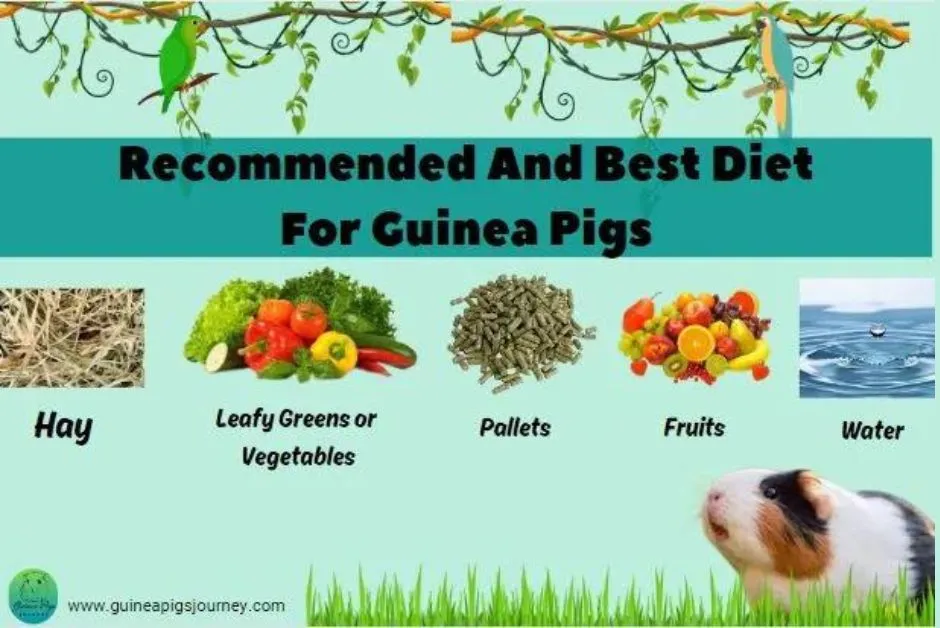Greetings Guinea Parents! Are you worried about your furry friend’s most suitable, recommended and best diet for guinea pigs diet? Then you are at the right place to answer your query, after going through this long guinea pig journey and experience for these furry friends I have learned some important tips that I would love to share with my fellow guinea parents.
Guinea pigs are lovely creatures and need proper care and love to understand their nutritional requirements and needs. Being a responsible owner it is equally important for us to understand the recommended and best diet for guinea pigs. But it is very important to first understand why a healthy and best diet is important for my guinea pigs. So let’s go through this important question;
Read Also Those Foods Not Recommended To Feed Guinea Pigs
Why A Healthy And Best Diet Is Important For My Guinea Pigs?
Just like humans! Guinea pigs also require a healthy, suitable, recommended and best diet for guinea pigs for their overall good health and to keep them healthy and fit. Without proper care and guidance for a healthy diet for guinea pigs, you may miss the important and correct percentage of nutrients, vitamins, minerals, and many other benefits which if not provided to guinea pigs may lead to many health-related problems like gastrointestinal health, tooth health, vitamin C deficiency, digestion issues, etc. even leading to death. Let’s highlight some light on some common issues related to guinea pig’s health due to poor diet management and missing the recommended and best diet for guinea pigs.
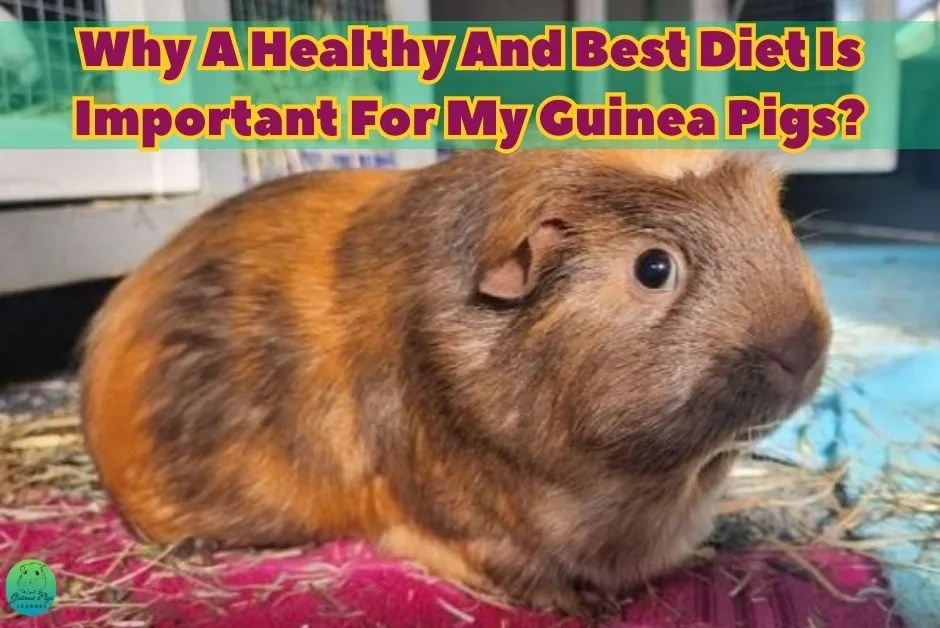
Vitamin C: Guinea pigs require an average of 10-30 mg of Vitamin C which guinea pigs could not synthesize naturally on their own, just like humans. Vitamin C prevents scurvy a serious concern even leads to malnutrition in guinea pigs and also repairs tissues, helps the body absorb iron, and boosts their immune system to fight against infections and diseases that are susceptible in guinea pigs. Fresh Green veggies and some citrus fruits like orange and grapefruit if fed in moderation are good sources for guinea pigs to get enough vitamin C and are a good option for recommended and best diet for guinea pigs.
Gut Health: A good fiber diet is recommended and best diet for guinea pigs to ensure their gut health and digestive system are healthy and moving. Fiber supports a healthy digestive system and helps in lowering cholesterol which means reducing the chances of heart failure and potential heart diseases by preventing oxidative damage that is specifically associated with heart damage for guinea pigs. Low fiber intake can cause a guinea pig’s gut to slow down or even stop working completely (also known as “gut stasis”). Fresh quality hay, grass, and other green veggies can provide good fiber for guinea pigs and can be a good option for the recommended and best diet for guinea pigs.
Tooth Health: Guinea pig’s tooth health is very important due to the constantly growing process. So, guinea pigs need to chew fiber constantly to grow them in strong and proper. The act of chewing helps wear down their continuously growing teeth, preventing dental problems. If their diet does not have good fiber intake like hay or grass then their teeth cannot grow properly and they are at risk of having painful spikes that would prevent or painful for them while eating any food.
As with any dietary changes, it’s recommended to consult with a veterinarian to tailor the recommended and best diet for guinea pigs to their specific needs, especially if they have pre-existing health conditions or unique nutritional requirements.
What Should I Feed My Guinea Pigs?
Guinea pigs being herbivores creature love to eat plant-based food and leafy greens but ensuring their balanced diet for their overall health is equally important. For this reason, always introduce new food in moderation and gradual introduction into their diet. The recommended and best diet for guinea pigs is one that mimics their natural diet as much as possible. Listed below are some natural diet options for guinea pigs diet.
Hay/Grass:
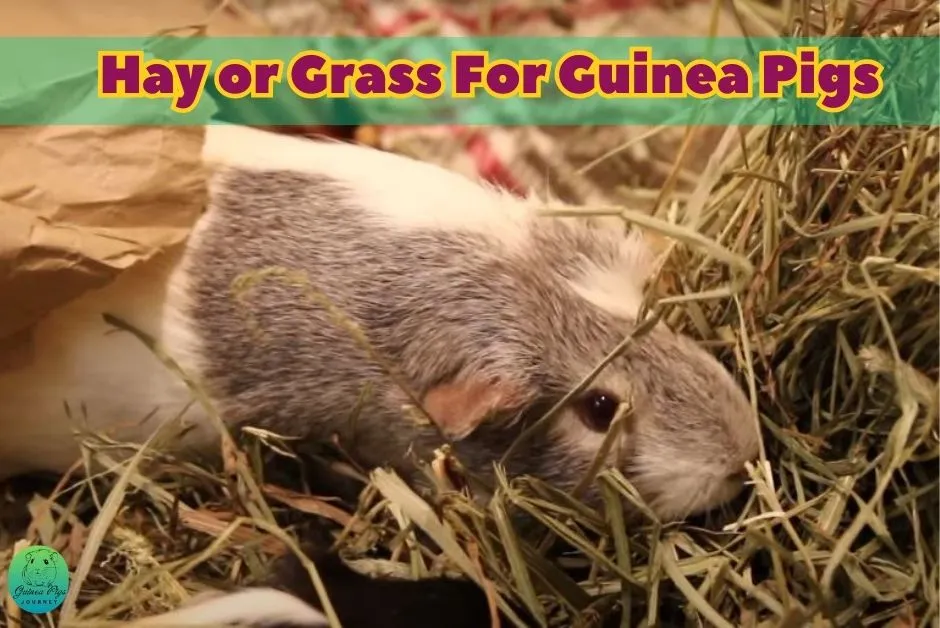
Guinea pigs require fiber in the form of hay and grass to keep their teeth strong and growing constantly and digestive health to function properly. Among many other benefits, hay helps prevent obesity, boredom, and gastrointestinal disease.
The recommended and best diet for guinea pigs contains almost 85 – 90 % fresh and good-quality hay and grass which must make up most of your guinea pigs’ diet daily and be available to them in their surroundings and cages. Guinea pigs naturally graze on grass, herbs, and some other plants like dandelions, groundsels, etc. for long periods and even day and night but ensure moderation in feeding hay or grass and can be a good option for the recommended and best diet for guinea pigs.
According to the Humane Society, the recommended and best diet for guinea pigs over a year of age may be timothy or orchard hay whereas for younger (less than six months), pregnant, nursing, or ill guinea pigs alfalfa hay provides more nutrients and calcium for growing bones of younger guinea pigs.
Why Is Hay Recommended And Best Diet For Guinea Pigs?
- Hay is so important for guinea pigs because it stimulates normal chewing and dental wearing patterns which save guinea pigs from the risks of dental disease.
- Hay helps in regulating the fermentation in the caecum a part of the intestinal tract which results in the production of a volatile fatty acid and vitamins essential for guinea pig’s health.
What Types of Hay Should I Feed To My Guinea Pigs?
Grass hay is a good option for recommended and best diet for guinea pigs daily diet which should make up most of my cavies diet. Grass hay includes Timothy hay, oat hay, orchard hay, and Lucerne (alfalfa hay). Important to note is Lucerne hay is rich in calcium if fed excessively to guinea pigs may lead to kidney or bladder stones, so that must be limited or fed in moderation to ensure overall health.
What Type Of Hay Or Grass Is Not Recommended To Feed My Guinea Pigs?
It is not recommended to feed guinea pigs with lawnmower clippings or mown grass, which will upset their digestive system and make them ill, because lawnmower clipping besides containing chemicals, also undergoes fermentation at a faster rate compared to fresh grass on the lawn, and this fermented grass can lead to bloating and other gastrointestinal issues and digestive issues. Feed only grass that has been hand-pulled or cut by hand which is a recommended and best diet for guinea pigs.
Fresh Leafy Greens or Vegetables:

Guinea pigs require fresh leafy greens like arugula, cilantro, mustard greens, etc., and vegetables like snap peas, asparagus, zucchini, etc. to fulfill their nutritional requirements every day which helps them to get enough amount of nutrients, minerals, fiber, vitamin C (they can’t produce it themselves), Vitamin A, K, etc to meet the recommended and best diet for guinea pigs.
The recommended and best diet for guinea pigs also contains ½ to 1 teacup of fresh greens or vegetables per guinea pig, per day, which can be split into morning and evening feed to ensure moderation. It is also recommended that you try to incorporate 4-5 different veggies as a treat including some which are high in vitamin C to ensure a good balance of nutrients.
According to the Humane Society, Leafy greens like romaine lettuce, red and green leaf lettuces, turnip or mustard greens, cabbage, kale, cilantro, and parsley should comprise the bulk of your pig’s fresh produce and can also be a good option for the recommended and best diet for guinea pigs. It is also recommended to introduce greens or veggies gradually if your guinea pigs are new to fresh veggies and leafy greens and avoid giving them excessively or more than the recommended size of the daily allowance.
To read the recommended size of each veggie search your choice of leafy greens or veggies here;
Listed below is the huge variety of vegetables and leafy greens that are safe to feed guinea pigs and some are rich in vitamin C than others for guinea pigs to meet the requirements of recommended and best diet for guinea pigs.
Safe Leafy Greens or Vegetables:
| Vegetables | Remarks | Vegetables | Remarks |
| Artichoke leaves | To be fed in moderation | Zucchini or Courgette (and flowers) | Once or twice a weak |
| Baby corn on the cob | Yellow Veggie (To be fed in moderation) | Green beans | To be fed in moderation |
| Bell Peppers | High in vitamin C | Lettuce – Butterhead, Red leaf, Cos, Little Gem | Leafy Greens (Not iceberg lettuce) |
| Beetroot | To be fed in moderation | Parsnips | To be fed in moderation |
| Broccoli | High in vitamin C | Pak Choi/Bok Choi | To be fed in moderation |
| Carrot tops | Yellow Veggie (Once or twice a week) | Snap Peas | To be fed in moderation |
| Cauliflower leaves and stalks | To be fed in moderation | Arugula or Rocket salad | Leafy Greens (To be fed in moderation) |
| Celery leaves | To be fed in moderation | Savoy cabbage | To be fed in moderation |
| Cilantro and Parsley | Leafy Greens (To be fed in moderation) | Spring greens | High in vitamin C |
| Chicory | To be fed in moderation | Swiss chard | To be fed in moderation |
| Collard greens | To be fed in moderation | Tomato (not leaves/vine, as poisonous) | High in vitamin C – Once or twice a weak |
| Asparagus | High in vitamin C | Parsley | Leafy Greens (high in vitamin C) |
| Broccoli | (too much can cause gas) – high in vitamin C | Red cabbage | To be fed in moderation |
| Brussels sprouts | (too much can cause gas) | Romaine lettuce | Leafy Greens (To be fed in moderation) |
| Cabbage | (dark green varieties) | Spinach – | high in vitamin C |
| Cucumber | (too much can cause diarrhea) | Watercress | To be fed in moderation |
| Kale | High in vitamin C | Wheatgrass | To be fed in moderation |
| Sweet Potato | Yellow Veggie (Once or twice a weak) | Radicchio | To be fed in moderation |
| Sugar snap peas | High in vitamin C | Mustard Greens | To be fed in moderation |
Safe Herbs:
Fresh Fruits:
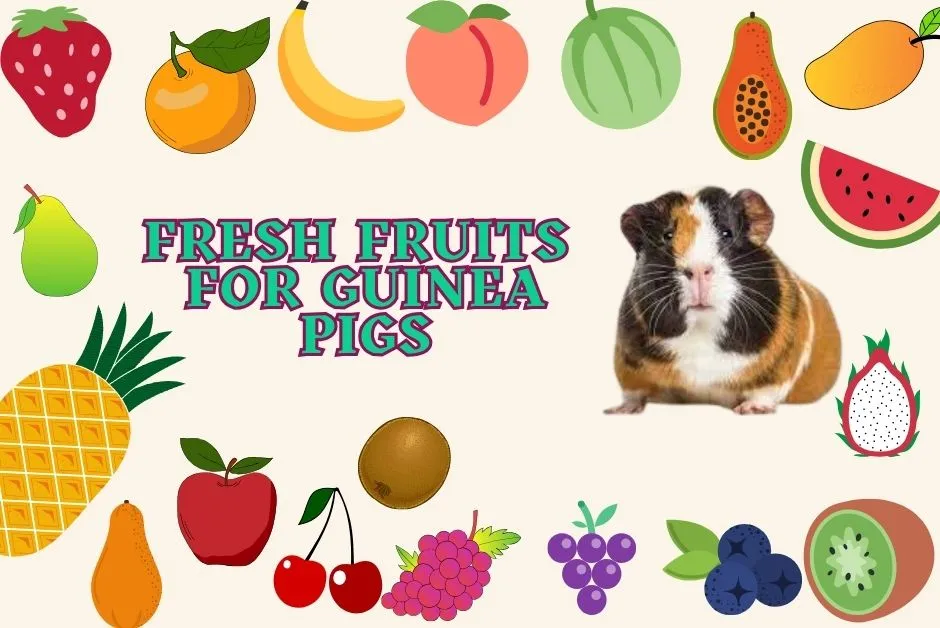
Guinea pigs’ nutritional requirements and recommended and best diet for guinea pigs can also be achieved through some safe fruits which can be served as a treat in their diet once a day or several times a week. Some fruits rich in vitamin C include Kiwis, strawberries, and some citrus fruits like orange or grapefruit that can boost the requirement of vitamin C for guinea pigs if fed in moderation. It is recommended to keep the portion and size of serving small since fruits are rich in sugar content that can be harmful if fed excessively to guinea pigs and cause several health risks for guinea pigs.
To ensure the recommended and best diet for guinea pigs here are some fruits that you can consider in moderation for your guinea pigs:
Blackberries, Plums, Pomegranates, Cherries, Honeydew melons, Dragon Fruit, Pears, Nectarines, etc.
It is recommended to introduce the fruits gradually in the guinea pigs diet to avoid any kind of health issue or digestive problem. If it is for the first time or your guinea pigs are new to feeding fruits, introduce them gradually. Also, monitor their stool showing loose stool then reduce or stop the amount of serving fresh produce for some days then again reintroduce it in smaller portions or size after some days.
Pallets:
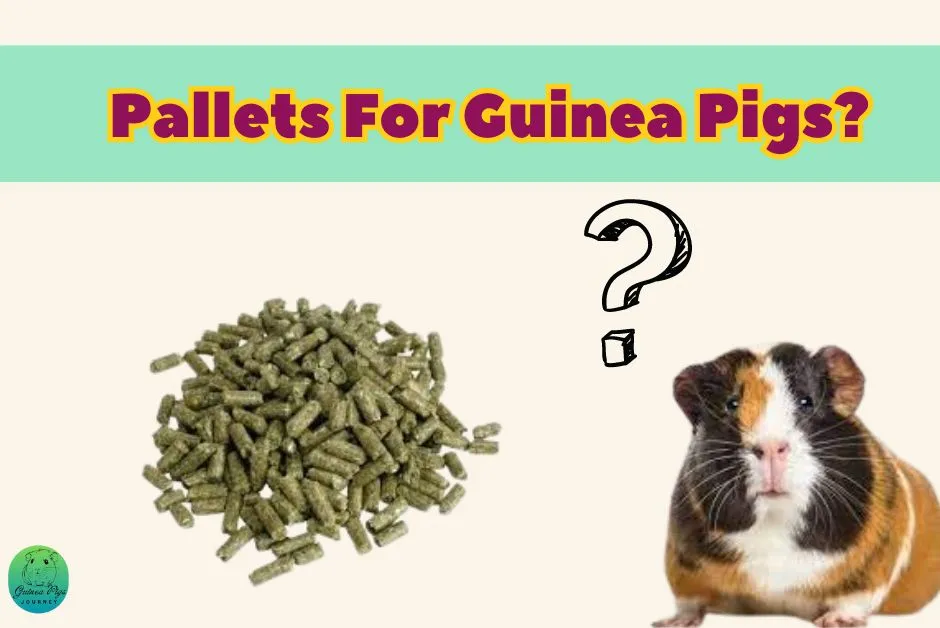
Due to the specific dietary needs of guinea pigs and to ensure the optimum nutritional requirements and vitamin C, you can also provide them with small quantities i.e. one tablespoon of fresh grass-based guinea pig pallets per adult guinea pig each day or as per the manufacturer instructions and guidelines mentioned on pallets bag, It should not be the main staple for guinea pigs as it can be fed alongside hay, grass and fresh fruits or veggies to guinea pigs to maintain the recommended and best diet for guinea pigs.
You will find pallets in many brands available at your local pets at home stores, pallets are a mix of grass, hay, and others rich in fiber ingredients as well as some essential proteins and vitamins.
It is advised to make sure the pallets you choose are made specifically for guinea pigs and are in a consistent shape and color, also avoid feeding flavored pallets to guinea pigs as it can cause digestive issues or other health risks. It is also advised to check the expiry date before feeding the pallets to guinea pigs for the recommended and best diet for guinea pigs and just do not top up the bowl, always feed in the recommended quantity. Ask your veterinarian for any guidance about your pregnant, nursing, growing, underweight, or ill guinea pigs for the portion of serving pallets to guinea pigs.
Fresh And Clean Drinking Water:

One of the most important things recommended and best diet for guinea pigs to incorporate into guinea pig’s overall health is fresh, clean, chlorine-free, drinking water which is very crucial for their overall health and must be changed daily to maintain a healthy lifestyle.
Key-Takeout:
- Guinea pigs are herbivores creatures, which means they only eat plant-based food and require extra care to provide them with the required nutrients for their overall health.
- Guinea pigs eat fresh grasses and some wild plants in the wild.
- It is very important for their constantly growing teeth to take fiber-rich food and for their good digestive system as well.
- Guinea pigs also require vitamin C (which they cannot produce) in a good quantity daily for their immune system and overall good health.
- Moderation is the key to serving any food, which can provide numerous health benefits and nutritional boosts to your cavies.
- Always introduce the new food gradually in the guinea pig’s diet to ensure the optimum nutritional requirements and food adjustments.
- Always monitor their reaction and behavior to keep them active and healthy.
- Do not hesitate to give a call to your veterinarian for guinea pigs’ food, health, diet plan, nutritional requirements, or any kind of help and guidance.

